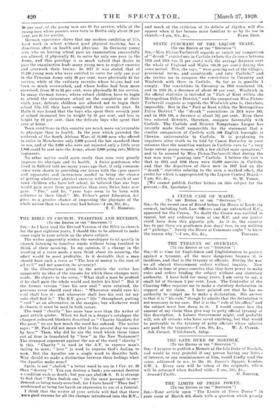THE BIBLE IN CHURCH: TRADITION AND REVISION. Lilo THE EDITOR
OF THE " SPECTATOR.") SIR —As I have used the Revised Version of the Bible in church for the past eighteen years, I should like to be allowed to make some reply to your article on the above subject.
The writer apparently wishes the worshipper to sit quietly in church listening to familiar words without being troubled to think of their meaning. In my opinion, if a change in the wording of a verse made a man think about its meaning, the effect would be most profitable. Is it desirable that a man should hear such a verse as " The love of money is the root of all evil" and not question its accuracy?
In the illustrations given in the article the writer has apparently no idea of the reasons for which these changes were made. He objects to the verse, "What shall a man be profited if he shall gain the whole world and forfeit his life?" But if the former version "lose his own soul" were retained, the previous verse Should read thus : "Whosoever would save his soul shall lose it : and whosoever shall lose hi soul for my sake shall find it." The R.V. gives " life" throughout, putting " soul " as an alternative in the margin; but whichever word is chosen, it must be used in both verses.
The.word " charity " has more base uses than the writer of your article quotes. When we find in a draper's catalogue the cheapest coloured blankets described as "Charity blankets for the poor," we see how much the word has suffered. The writer says: "St. Paul did not mean what in the present day we mean by lore." Then, why did he use the word which three times out of four is translated by "love" in the New Testament? The strongest argument against the use of the word "charity" is this. "Charity" is used in the A.V. to express man's feeling to man; "love" is used to express God's feeling to man. But the Apostles use a single word to describe both. Why should we make a distinction between these feelings when the Apostles make none?
Again, is not " abolish " a better word to use in 1 Cor. xv. 26 than " destroy "? You can destroy a book; you cannot destroy a condition such as death; but you can abolish it. It is strange to find that "Thou foolish one" (in the same passage) is con- demned as being mealy-mouthed; for I have heard "Thou fool" condemned as being too harsh an expression to use at a funeral.
I think that the writer of your article will find that there were good reasons for all the changes introduced into the RN.; and much of the •criticism of -its defects of rhythm will dis- appear when it has become more familiar to us by its use in


































 Previous page
Previous page